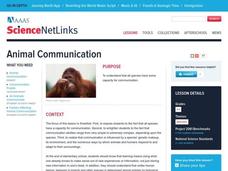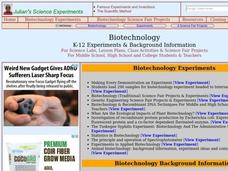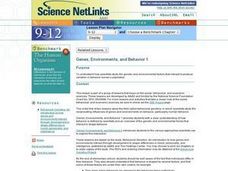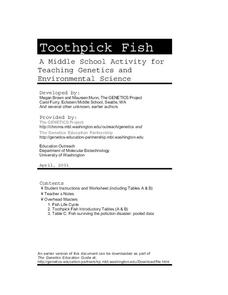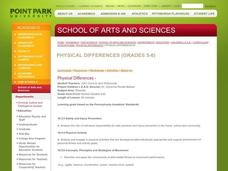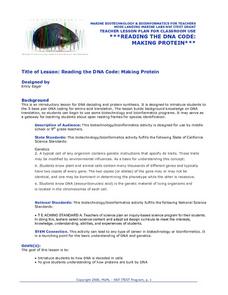Curated OER
What is Biotechnology?
Young consumers explore the concept of biotechnology as it pertains to the foods they eat, economics, and agriculture. They watch several videos, explore a website, complete worksheets, and engage in class discussion. Son they'll know...
Curated OER
Careers in Health
Middle schoolers will identify several professions in the healthcare field along with the characteristics of effective healthcare providers. They will also consider if any of the occupations covered in class are appropriate career paths....
Curated OER
Genes, Environments, and Behavior 2
Students explore the genetic and environmental factors that interact to produce variation in behavior across a population. They are introduced to the various approaches scientists use to explore this interaction. Students explore how...
Curated OER
Animal Communication
Students understand that all species have some capacity for communication. Students are exposed to the fact that all species have a capacity for communication. They are enlighten to the fact that communication abilities range from very...
Curated OER
The Illusion of Race
This is mostly an exploration of race through an interactive website, class readings, and discussion. Individuals take an online quiz about race, they answer questions on a worksheet by visiting another website, and discover that race is...
Curated OER
Physiological Adaptations
Students investigate the concepts of genetics and how it is tied to the variations found within different species and how it is tied to adaptations. They review the theory of evolution and factors found to help create variation. The...
Curated OER
Biotechnology
Students explore biotechnology through various activities. In this biology lesson, students analyze its pros and cons. They study and read informative articles about biotechnology.
Curated OER
Toothpick Fish
Young scholars experiment with genes and environment for a population of "Toothpick Fish."
Curated OER
Edible DNA
Pupils use multicolored soft candies (gumdrops and candy orange slices) and toothpicks to create models of DNA structures. They discuss the fact that DNA must copy itself before splitting into two cells. Students demonstrate this by...
Curated OER
DNA
Students explore the basics of DNA and its history. In this DNA lesson students extract DNA from fruits and understand how it is used in forensics.
Curated OER
Gene Puzzles
Young scholars come to understand that in sexually reproducing organisms, such as humans, typically half of the genes come from each parent.
Students examine a fictional pedigree and determine which gene is responsible for a given trait....
Curated OER
Genes, Environments, and Behavior 1
Students examine how scientists study the genetic and environmental factors that interact to produce variation in behavior across a population.
Curated OER
What Do Genes Look Like?
Seventh graders describe the basic structure of the DNA molecule. They identify what an inherited trait is and how it can be determined by one or more genes. Finally, 7th graders identify that plant and animal cells contain several...
Curated OER
Genes, Environments, and Behavior 2
High schoolers explore how scientists study the genetic and environmental factors that interact to produce variation in behavior across a population.
Curated OER
Making Babies
Sixth graders complete a human traits survey. In this genetics activity students read articles and fill out a worksheet on genotype and phenotypes.
Curated OER
Cell Structure and DNA
Sixth graders identify, locate and describe the function of the parts of a cell. In groups, they state the five stages of mitosis and put them in the correct order. They are introduced to the structure of DNA and mRNA and how they...
Curated OER
Genes
Young scholars explore the history, inheritance and mutations of genetics. In this genetic lesson students complete experiments on DNA sequences.
Curated OER
Cotton and Cabbage
High schoolers note how given traits could be achieved by selective breeding and by transgenesis. They identify different uses of GEO. Students recognize that the use of letters (Bt) before an organism's name means that the organism has...
Curated OER
Memory Book - A Cooperative Learning Experience
Students document sections of their life through pictures, stories, and video to create an English "memory book". They use photographs, video and edited video which includes their history, includes calculated growth, and genetic...
University of Washington
Toothpick Fish
With colored toothpicks representing genes, youngsters practice passing them through generations of fish and learn about heredity. Consider this as an introductory activity since it does not represent recessive genes with lowercase...
Curated OER
Diversity
Students access prior knowledge of the five senses and relate to students with disabilities. In this people with disabilities instructional activity, students research and use a Venn diagram to compare and contrast famous people and...
Curated OER
In the Future we will all be Mixed Bloods and Mestizoes
Students examine the concept of origin and ethnicity. In this ethnic studies instructional activity, students engage in a variety of interdisciplinary activities including posters, and discussions to better understand our past and future.
Curated OER
Reading the Dna Code: Making Protein
Students study DNA decoding and protein synthesis. They use the amino acid table to translate DNA, break DNA strands into three nucleotide codes, and translate nucleotides into amino acid protein codes. They research the importance of...





